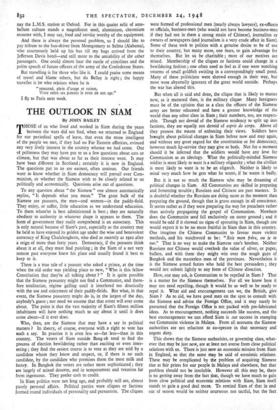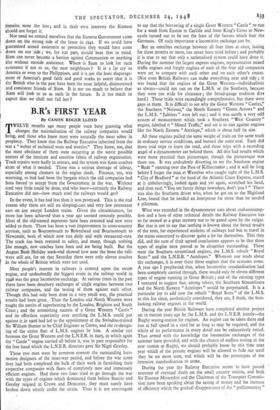THE OUTLOOK IN SIAM
By JOHN BAILEY
THOSE of us who lived and worked in Siam during the years between the wars did not find, when we returned to England for our periodical spells of leave, that even the more intelligent of the people we met, if they had no Far Eastern affinities, evinced any very lively interest in the country whence we had come. Out of politeness they may have put to us a few questions about cats or climate, but that was about as far as their interest went. It may have been different in Scotland ; certainly it is now in England. The questions put to us are earnest, often anxious. Our friends want to know whether in Siam democracy will prevail over Com- munism, or whether the Siamese wish to be closely related to us politically and economically. Questions arise out of questions.
To any question about " the Siamese" one almost automatically replies, " It depends what you mean." The great bulk of the Siamese are peasants, the men—and women—in the paddy-field. They enjoy, or suffer, little education as we understand education. To them whate'er is best administered is best ; they are naturally obedient to authority in whatever shape it appears to them. The form of government they really comprehend is an autocracy. This is only natural because of Siam's past, especially as the country may be held to have enjoyed its golden age under the wise and benevolent autocracy of King Chulalongkorn, who died as recently as 1910 after a reign of more than forty years. Democracy, if the peasants think about it at all, they must find puzzling ; in the Siam of a not very remote past everyone knew his place and usually found it best to keep to it.
There is a true tale of a peasant who asked a prince, at the time when the old order was yielding place to new, " Who is this fellow Constitution that they're all talking about ? " It is quite possible that the Siamese peasantry might not find a Communist, and there- fore totalitarian, regime galling until it interfered too drastically with the use and enjoyment of their paddy-fields. But what, in that event, the Siamese peasantry might do is, in the jargon of the day, anybody's guess ; nor need we assume that that event will ever come about. The point is that the vast majority of Siam's fifteen million inhabitants will have nothing much to say about it until it does come about—if it ever does.
Who, then, are the Siamese that may have a say in political matters ? In theory, of course, everyone with a right to vote has such a say. In practice it is even less so—far less—than in this country. The voters of Siam outside Bang ok tend to find the process of election bewildering rather than exciting or even inter- esting ; they find the easiest course is to vote as they are told by a candidate whom they know and respect, or, if there is no such candidate, by the candidate who promises them the most milk and honey. In Bangkok the voters are rather more sophisticated ; they are largely of mixed descent, and in temperament and vocation far from ingenuous. They prefer cash to credit.
In Siam politics were not long ago, and probably still are, almost purely personal affairs. Political parties were cliques or factions formed round individuals of personality and persuasion. The cliques were formed of professional men (nearly always lawyers), ex-officers or officials, business-men (who would not have become business-men if they had not in them a strong strain of Chinese), journalists or owners of newspapers (and journalism is a very crude affair in Siam). Some of these took to politics with a genuine desire to be of use to their country, but many more, one fears, to gain advantage for themselves. But let us be charitable ; most of our motives are mixed. Membership of the cliques or factions could change in a bewildering fashion ; one often used to feel as if one were watching swarms of small goldfish swirling in a correspondingly small pond. Many of these politicians were shrewd enough in their way, but most were abysmally ignorant of the great world outside. Perhaps the war has altered this.
But when all is said and done, the clique that is likely to matter now, as it mattered then, is the military cliquet Many foreigners must be of the opinion that as a class the officers of the Siamese army are better educated and have a greater knowledge of the world than any other class in Siam ; their numbers, too, are respect- able. Though not devoid of the Siamese tendency to split up into factions, they are equally not devoid of esprit de corps. Above all they possess the means of enforcing their views. Soldiers have brought about political changes in Siam before now and may again, and without any great regard for the constitution or for democracy, however much lip-service they may give to both. Not for a moment should it be inferred that the soldiers would have any love for Communism as an ideology. What the politically-minded Siamese soldier is most likely to want is a military oligarchy ; what the civilian is most likely to want is to be an oligarch. Neither is likely to mind very much how he gets what he wants, if he wants it badly.
But it is not so much the Siamese who may be dreaming of political changes in Siam. All Communists are skilled in preparing and fomenting trouble; Russians and Chinese are past masters. It is doubtful whether the Russians are doing more at the moment than preparing the ground, though that is grave enough in all conscience. It seems rather as if they were preparing the way for preachers rather than actively propagating the gospel of Communism. Nowhere does the Communist seed fall exclusively on stony ground ; and it would be odd if it showed no signs of sprouting in Siam, though one would expect it to be no more fruitful in Siam than in this country. One imagines the Chinese Communist to favour more violent methods, and his watchword to be: "Soil mon frere, ou je to tue." That is no way to make the Siamese one's brother. Neither Russians nor Chinese would overlook the value of silver, or paper, bullets, and with them they might win over the tough guys of Bangkok and the masterless men of the provinces. Nevertheless it is the Siamese armed forces who hold the best persuaders ; they would not submit lightly to any form of Chinese direction.
How, one may ask, is Communism to be repelled in Siam ? That is a matter for the Siamese themselves. For all we know here it may not need repelling, though it would be as well to be ready to repel it. What aid and encouragement can we, the British, give Siam ? As to aid, we have good men on the spot to consult with the Siamese and advise the Foreign Office, and it may surely be presumed that the Foreign Office is not packed with pre-fabricated ideas. As to encouragement, nothing succeeds like success, and the best encouragement we can afford Siam is Sur success in stamping out Communist violence in Malaya. From all accounts the Siamese authorities are not reluctant to co-operate in that necessary and urgent duty.
This shows that the Siamese authorities, or governing class, what- ever that may be just now, are at least not averse from close political relations with us. There is just now an economic mission from Siam in England, so that the same may be said of economic relations. These may be complicated by the problem of acquiring Siamese rice at fair prices for our people in Malaya and elsewhere, but that problem should not be insoluble. However all this may be, there is no getting away from the fact that, though we have much to gain from close political and economic relations with Siam, Siam itself stands to gain a good deal more. To remind Siam of that in and out of season would be neither courteous nor tactful, but the fact
*mains none the less ; and in their own interests the Siamese should not forget it.
Nor need we remind ourselves that the Siamese Government came down on the wrong side of the fence in i941. If we could have guaranteed armed assistance or protection they would have come down on our side ; we, for our part, shoUld bear that in mind. Siam can never become a bastion against Communism or anything else without outside assistance. Where is Siam to look for such assistance if not to us, the near neighbouis ? It is a far cry to America or even to the Philippines, and it is not the least disparage- ment of America's good faith and good works to assert that it is the British who in the past have been the most helpful, disinterested and consistent friends of Siam. It is not too much to believe that Siam will look to us as such in the future. Is it too much to expect that we shall not fail her ?



































 Previous page
Previous page